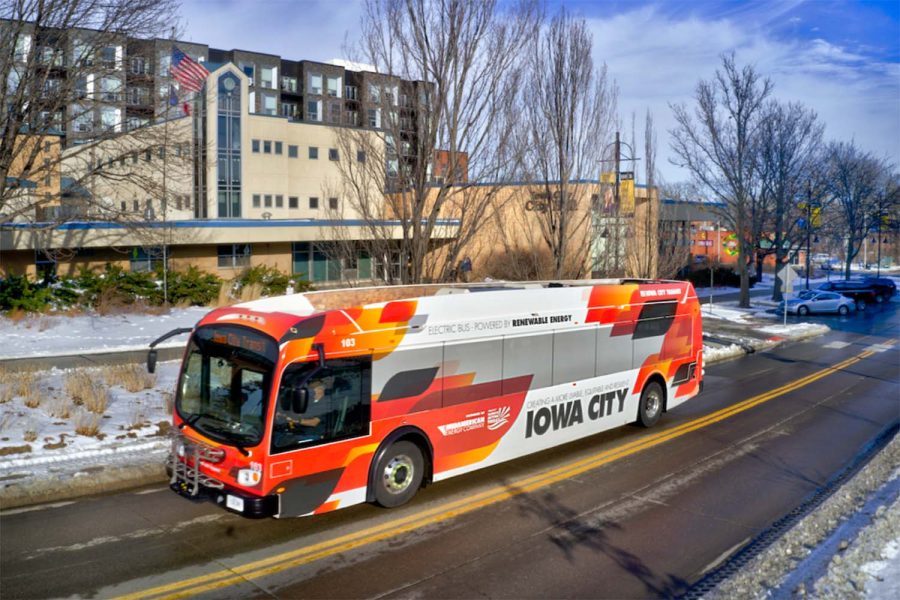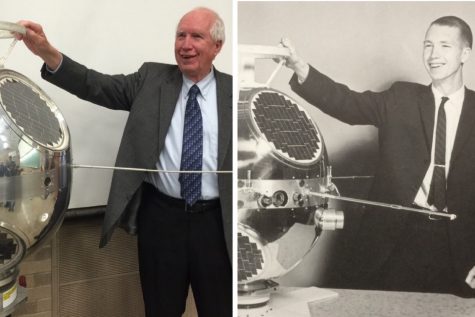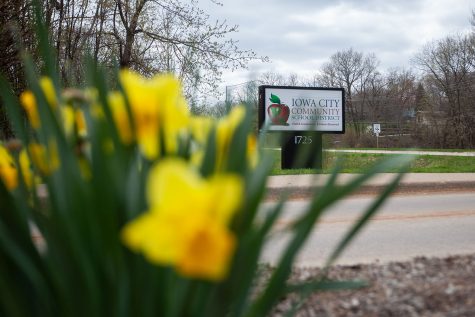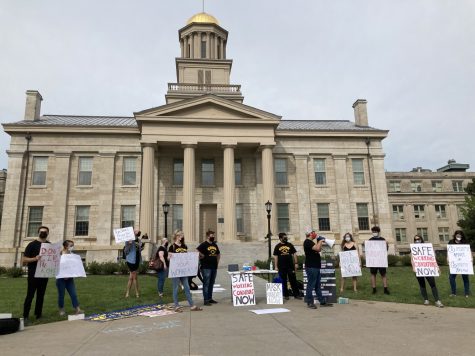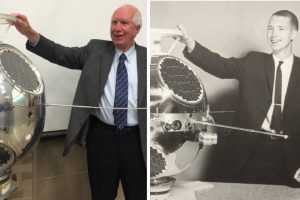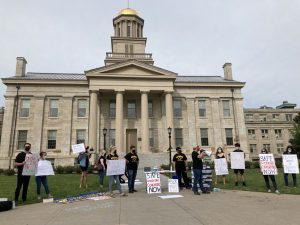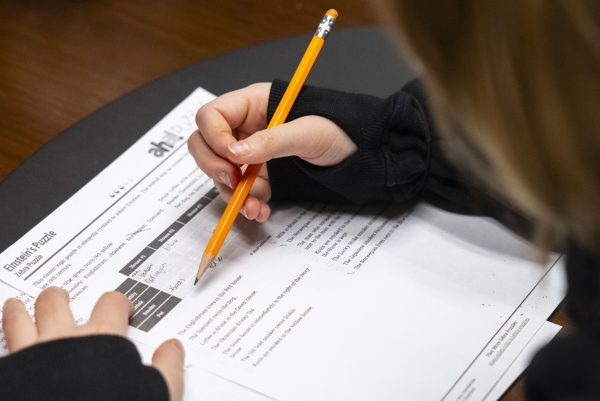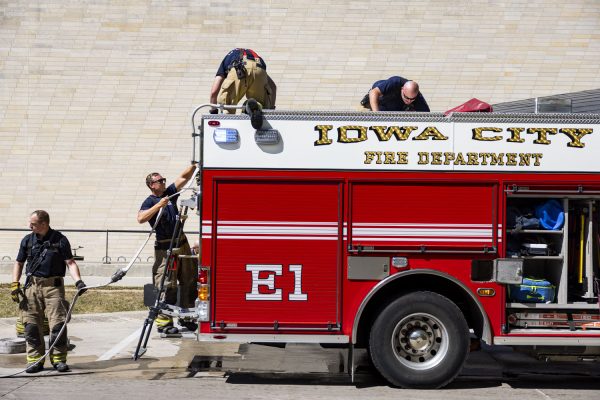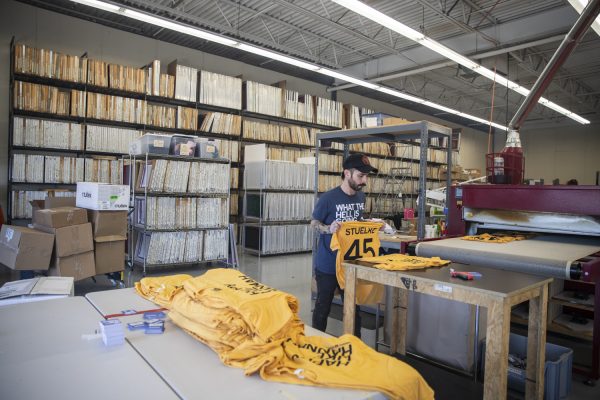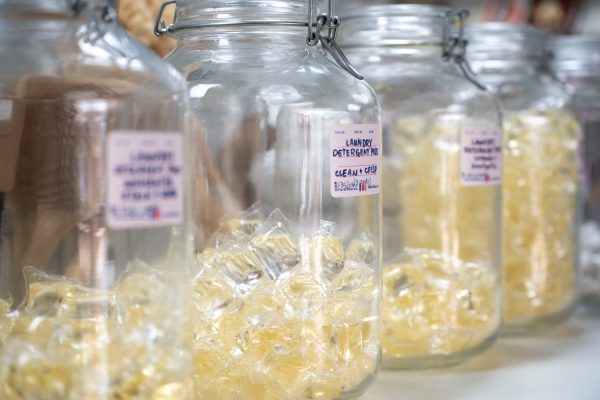Iowa City unveils four electric buses, projects lower emissions and upkeep costs
Iowa City is replacing four of its diesel buses with new electric buses purchased with grants from the Federal Transit Administration and the Iowa Department of Transportation.
January 23, 2022
Iowa City is rolling out four new electric buses on Monday, as part of a 2017 climate action plan.
The city, which has used diesel buses since 1971, is going electric for the first time, with the electric buses replacing four diesel buses in its 27-bus fleet.
Darian Nagle-Gamm, Iowa City transportation director, said the electric buses are projected to use only 5 percent of the diesel fuel the current buses use.
“The buses are completely propelled by electric, and that auxiliary heater that’s powered by diesel will just be used in the cold weather months to provide that additional heat without taking away from power that’s used to to keep the buses on the road,” Nagle-Gamm said.
Nagle-Gamm said this is the first of many planned steps to reduce emissions, as the city plans to get more electric buses in the future.
“We do have some buses that are probably in the age range where they would potentially qualify for replacement,” Nagle-Gamm said. “So, I would say within the next year or two, we’ll probably be applying for more grants … I think we can expect, really, as we roll in any new buses on the road, they’re likely going to be new, cleaner, greener, more sustainable technology.”
The buses were paid for with $3.3 million in grant money from the Federal Transit Administration, along with the Iowa Department of Transportation.
“You’re going to get cost savings in multiple ways with electric buses,” Nagle-Gamm said. “It is less expensive to fuel them. Electric power is less expensive for us to actually feel the losses. We don’t have a transmission and a conventional engine to deal with, and that requires a lot of maintenance.”
Currently, 22 percent of Iowa City’s carbon dioxide emissions come from transportation.
Nagle-Gamm said the electric buses will significantly reduce emissions. She added that, on average, one diesel bus uses 39 gallons of fuel per day.
“MidAmerican Energy is producing our power, [which] is 84 percent renewable energy, and most of that is wind,” Nagle-Gamm said. “So, not only are we consuming energy which is less polluting for the vehicles as they travel through the community, and better for air quality, but the energy that’s being consumed is of a much cleaner source.”
Jerry Schnoor, University of Iowa professor of environmental engineering, said the introduction of four electric buses into the fleet is a good first step not only for Iowa City, but for the state of Iowa overall.
“Ames is doing pretty much the same thing in connection with Iowa State, and other cities are looking at it, including Des Moines, so I think it’s the start of a trend towards electric buses, and Iowa is a good spot to do it, because we are in the top 10 states in terms of use of renewable energy as a fraction of our total,” Schnoor said.
Director of Transit for Iowa State University’s CyRide Barbara Neal said CyRide, equivalent to the UI’s Cambus campus transportation, plans to introduce two electric buses to its fleet starting this summer — plans which have been years in the making.
“In 2019, I applied for the Federal Transit Administration Low or No Emission grant to start getting the battery electric infrastructure and try a couple buses and see how it works in our service,” she said.
The Center for Transportation and the Environment projects the two new electric buses will save “295,013 pounds of greenhouse gasses” per year, she said, and have more electric buses on the way.
“We have three scheduled in 2023,” Neal said. “And then we have one scheduled in 2026 and one scheduled in 2027.”
Schnoor said policies in cities like St. Louis, where every car has to be inspected for greenhouse gas emissions, might not be the answer for Iowa.
“I wouldn’t go that direction,” he said. “I guess I would favor more of the carrot rather than the stick. That is, to try to make incentives [to] make it easy for people to buy electric vehicles, or at least hybrid vehicles.”



